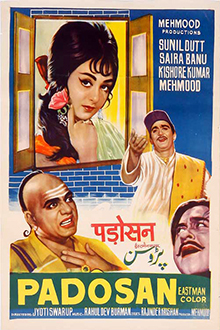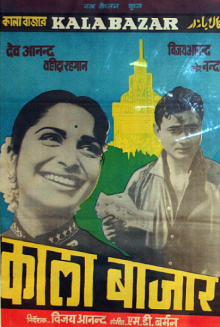
Prabodh Chandra Dey, known by his stage name Manna Dey, was a renowned Indian playback singer, music director, and musician. He had a classical music background, being part of the Bhendibazaar Gharana and receiving training under Ustad Aman Ali Khan. Manna Dey is widely recognized as one of the most versatile and celebrated vocalists in the Hindi film industry, and is often acknowledged for his significant contributions to integrating Indian classical music into Hindi commercial cinema. As a musician, Dey is particularly acclaimed for incorporating Indian classical music elements into a pop musical framework, a contribution that played a pivotal role during the golden era of Hindi cinema.

Omkar Prasad Nayyar was an Indian film music composer, singer-songwriter, music producer, and musician. He is considered to be one of the most rhythmic and melodious music directors of the Hindi film industry. He won the 1958 Filmfare Award for Best Music Director for Naya Daur. Nayyar worked extensively with singers Geeta Dutt, Asha Bhosle, Mohammed Rafi, though not with leading Bollywood female singer Lata Mangeshkar.

Anandamath is a Bengali historical novel, written by Bankim Chandra Chattopadhyay and published in 1882. It is inspired by and set in the background of the Sannyasi Rebellion in the late 18th century, it is considered one of the most important novels in the history of Bengali and Indian literature. Its first English publication was titled The Abbey of Bliss.

Shamshad Begum was an Indian singer who was one of the first playback singers in the Hindi film industry. Notable for her distinctive voice and range, she sang over 6,000 songs in Hindustani, Bengali, Marathi, Gujarati, Tamil, and Punjabi languages, among which 1287 were Hindi film songs. She worked with renowned composers of the time, such as Naushad Ali and O. P. Nayyar, for whom she was one of their favorites. Her songs from the 1940s to the early 1970s remain popular and continue to be remixed.

Kamini Kaushal is an Indian actress who worked in Hindi films and television. She is noted for her roles in films such as Neecha Nagar (1946), which won the 1946 Palme d'Or at Cannes Film Festival and Biraj Bahu (1954), which won her the Filmfare Award for Best Actress in 1956.

Trishul (transl. Trident) is a 1978 Indian Hindi-language action drama film, directed by Yash Chopra, written by Salim–Javed and produced by Gulshan Rai. It features music by Mohammed Zahur Khayyam, with lyrics by Sahir Ludhianvi. The film features an ensemble cast of Shashi Kapoor, Sanjeev Kumar, Amitabh Bachchan, Hema Malini, Raakhee Gulzar, Poonam Dhillon, and Sachin, with Waheeda Rehman in a special appearance.

Padosan is a 1968 Indian Hindi-language musical comedy film directed by Jyoti Swaroop and produced by Mehmood, N. C. Sippy and written by Rajendra Krishan. It is a remake of the Bengali-language film Pasher Bari (1952) based on a short story of the same name by Arun Chowdhury, starring Bhanu Bandyopadhyay and Sabitri Chatterjee. The film stars Sunil Dutt and Saira Banu. Kishore Kumar, Mukri, Raj Kishore and Keshto Mukherjee played the supporting roles.

Kala Bazar is a 1960 Hindi crime film produced by Dev Anand for Navketan Films. Written and directed by Dev's younger brother Vijay Anand, the film starred Dev Anand, Waheeda Rehman, Vijay Anand, Chetan Anand, Nanda, Rashid Khan, Madan Puri, Leela Chitnis, Mumtaz Begum and Helen. S.D. Burman composed the music, while the lyrics were penned by Shailendra.

Sargam is a 1979 Hindi-language drama film written and directed by K. Viswanath. It was the Hindi version of his earlier Telugu film Siri Siri Muvva (1976), which also starred Jaya Prada and made her a star in South India. She made her Hindi film debut with this film, repeating her role of a mute dancer.
Om Prakash Bhandari, better known as Qamar Jalalabadi, was an Indian poet and lyricist of songs for Hindi movies. He composed the title track of the popular television serial Vikram Aur Betaal.
Hasratein (Desires) is an Indian television soap opera that was telecast on Zee TV in the mid 1990s. It is based on the Marathi novel "Adhantari" by Late Shri Jaywant Dalvi. Hasratein focuses around successes of extra marital relationships. One of the main stories is of Savi, a woman who leaves her husband and maintains an extra-marital relationship with another married man, with both their spouses being aware of the situation. Her actions were due to the fact that years ago, during her childhood, her mother left her father for a young man. The show emphasizes the societal strain placed on marriages in Indian culture, especially roles given to the female spouse resulting in boredom felt by the male spouse. Hasratein was one of the most popular television shows of the mid and late 1990s. According to Shubhra Gupta, film and television critic, the popularity of the serial "had made it a catalyst for the discussion of issues of marital discord, in spite of the embarrassment the serial generated for many people."
Tumhare Liye is a 1978 Indian Hindi-language film directed by Basu Chatterjee. The film stars Sanjeev Kumar, Vidya Sinha and Ashok Kumar as leads with music scored by Jaidev.

Zohrabai Ambalewali was an Indian classical singer and playback singer in Hindi cinema in the 1930s and 1940s. She was considered one of the most popular female playback singers of early and mid 1940s.
Naukri is a 1954 Indian Hindi-language film directed by Bimal Roy for Bimal Roy Productions. The lead actors were Kishore Kumar and Sheila Ramani. This film is about the dreams and aspirations of the educated youth getting shattered as they struggle in the city for employment, in the ensuing years after India attained independence. Naukri and Baap Beti (1954) are cited as "sensitive" and "memorable" films from Roy. In Naukri, Bimal Roy tackles yet another social problem, this time involving unemployment. Naukri is one of the earliest films where Kishore Kumar first gained prominence. Since his comic persona had not yet fully developed, Naukri sees a sincere, sensitive and restrained performance from him.

Bhai-Bhai (transl. Brothers) is a 1956 Indian Hindi-language drama film directed by M. V. Raman for A. V. M. Productions. It had screenplay by Javar Seetharaman, with Hindi screen adaptation of the Tamil film Ratha Paasam directed by C.V. Sridhar. The music director was Madan Mohan, with dialogues and lyrics written by Rajendra Krishan. One of the popular songs from the film was "Ae Dil Mujhe Bata De", sung by Geeta Dutt, "in an unabrasive fast tempo". The song became one of Madan Mohan's earliest hits, and the music of the film in journalist-author Bharatan's words, went on to "conquer the box office".

Piyaa Albela is an Indian soap opera by Rajshri Productions broadcast on Zee TV. The show focuses on a modern retelling of the love story of Menaka and Vishwamitra. It was produced over about eight years by Sooraj Barjatya, while Raghvendra Singh wrote the lyrics. The soap opera stars Akshay Mhatre and Sheen Das. The show began airing from 6 March 2017, replacing Jamai Raja, and went off air on 24 August 2018. It was replaced by Tujhse Hai Raabta.

Sunehre Din is a 1949 Indian Hindi-language romance film directed by Satish Nigam and produced by Madan Lal Mehrotr. The film stars Raj Kapoor, Roop Kamal, Nigar Sultana and Rehana, with Ramesh Sinha, Indumati, Heera, Kamalakant and Mahendra in supporting roles. The soundtrack was composed by Gyan Dutt. The film was based on a story written by Satish Nigam.

Gateway of India is a 1957 Indian Hindi-language black comedy film directed and produced by Om Prakash and cinematographed by G. Singh. The film is edited by Dharamvir and music is composed by Madan Mohan. It features an ensemble cast including Bharat Bhushan, Pradeep Kumar, Madhubala, Anita Guha, Johnny Walker, Master Bhagwan.
Satish Vyas) is a former Indian actor in Hindi and Gujarati language films.
Vatsala Deshmukh was an Indian Marathi and Hindi actress.














